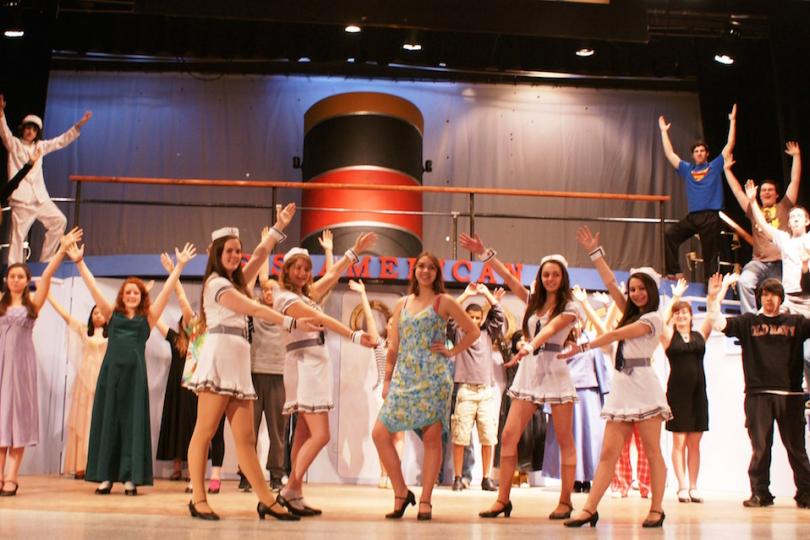The joys of small town Minnesota theater

I was on the phone with my mom recently, discussing an upcoming parental visit. I suggested that we could catch a play while she was in town. She asked what was playing and I shrugged and said I’d scan the listings and find something good. She laughed bemusedly and said, “There’s always something happening there, isn’t there?”
My mom is right, of course. There is always something happening on the Twin Cities theater-scape, and usually multiple somethings happening all at the same time. It’s the type of thing that’s easy to take for granted when you’ve been immersed in it long enough. We have the luxury of choosing between dramas, comedies, musicals, experimental performances and more practically every weekend of the year.
Sparta was spartan
Talking with my mom flashed me back to what live theater meant to me growing up in rural Wisconsin. We’ve all seen stories about small Midwestern towns with lively, active arts communities and dedicated theater spaces - I’ve written about quite a few of them in these pages, in fact. Suffice it to say that my town, Sparta, was not one of those. There was a small but enthusiastic local arts scene, certainly, but if you wanted to see theater on even a semi-regular basis you had to drive 30 or so miles to La Crosse.
Plays popped up from time to time, usually the work of loose-knit community theater groups or local churches, but for the most part the theater energy around town was driven by the bi-annual high school play. Almost all of my childhood memories of going to plays are rooted in the dingy, teenager-reeking confines of the Sparta High School auditorium. The roster of plays I remember seeing reads pretty much as you’d expect for a small town high school: The Sound of Music, Flower Drum Song, The King and I, Little Shop of Horrors (starring an impressive Audrey II puppet on loan from a company in Chicago), The Music Man, The Comedy of Errors, Godspell. They were usually musicals and always ensemble pieces, so as to showcase as many actors and skill sets as possible.
A sacred and treasured thing
I have no way of knowing how good any of those shows were. At the time I didn’t have much against which to compare them. In hindsight I assume they were no better and not much worse than your average high school production, but ultimately the quality of the plays didn’t much matter. People were going to come and see them regardless.
You could probably attribute that to a town like Sparta having nothing else to do, but I prefer to take the glass half-full view: seeing these plays was something to do. Going out to the theater was a social event, one that people got excited about and planned their calendars around. The audience for these productions wasn’t just the family and friends of the student actors. People from all corners of the community showed up, whether they had kids in school or not. Some folks even dressed up in their Sunday best for the occasion. The editor/arts critic of the local paper ran an extensive and invariably effusive review and every show came close to selling out.
Even though I never participated in high school theater - basketball season overlapped with both annual productions - I still remember the rush of excitement every time the curtain came up. A school play was one of the only non-sports events that could draw out such a broad swath of the citizenry. There was a genuine sense of community in that auditorium, a shared enthusiasm that couldn’t be rivaled by a night at the movie theater or even Sparta’s annual Butterfest celebration.
Can it compete with Butterfest?
I’ve been thinking about those long-ago high school plays lately as I peruse the Playlist calendar. I now have access to both a greater quality and quantity of theater than I did as a youth. Every week I have my choice of shows ranging from amazing to adequate to appalling. During Fringe I could conceivably see upwards of 20 plays in a single weekend. When I want to see a particular show, I usually have the luxury of picking the performance that best fits my schedule. It’s a beautiful position to be in and I’d have to be a grade-A moron to complain about it.
Still, sometimes I can’t help but miss that small-town theater experience. When you have to plan your schedule around a play knowing that it will be months before you have a chance to see another one, you come to appreciate the real value of theater. Mediocre though they may have been, those shows made an undeniable impression on me. I frequently need a Google-assist to recall the names of actors in even my favorite recent plays, but I could tell you who played every one of the “Whattaya talk” guys in Sparta High’s 1993 production of The Music Man.
It’s pointless for me to wax too nostalgic for those bygone plays, as it’s simply not something that can be replicated in an urban setting. The in-the-moment nature of live theater makes it almost impossible to establish that kind of communal experience in a city with so many options.
Bring up a hit movie or a popular TV show in a group of people and it’s likely that a solid percentage of folks will have seen it. Mention a high-profile local stage production even in a group of theater devotees and it’s considerably less likely that everyone will have had a chance to catch that particular show.
That’s a great problem to have in just about every regard - seeking out obscure and underseen arts experiences is more or less my raison d’etre, and the Twin Cities offer those in abundance - but sometimes I do get wistful for an arts scene where every new play is a sacred and treasured thing, an experience that will be remembered and talked about for years to come.
Then again, my theater options for a weekend a little while ago included a cabaret show about eating disorders, a play about a “Filipino Hulk Hogan,” a scathing style parody from the 17th Century, a dark comedy with a ghostly Kurt Vonnegut as a therapist, and the indefatigable Dykes Do Drag, among a dozen or so others. I reckon I’ll stay put for the time being.




